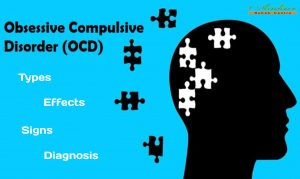
What is OCD?
Obsessive-compulsive disorder (OCD) is characterized by repetitive, unwanted thoughts (obsessions) and irrational, excessive urges to do certain actions (compulsions).
Although people with OCD may know that their thoughts and behaviors don’t make logical sense, they’re often unable to stop them.
About 2% of the world’s population, which is roughly 1 in 50 people, suffers from OCD, according to WHO (World Health Organization). And, based on a report by the National Institute of Mental Health, nearly 2% of Americans have obsessive-compulsive disorder.
Symptoms of OCD can vary from mild to debilitating for patients with serious obsessive-compulsive disorder. The most unusual part is that signs and symptoms range from person to person, which means even two OCD patients experience vastly different symptoms. Hence it is vital to reach a Mental Health Rehabilitation Center for help with the symptoms.
Let’s learn more!
Types of OCD
There are several kinds of obsessions and compulsions. Some well-known are:
- Obsessions that include fear of contamination (germs) with related compulsions of washing and cleaning
- Obsessions compared to symmetry or perfectionism with related compulsions of ordering or redoing
- Intrusive and undesired sexual thoughts
- Fear of hurting oneself or others
- The anxiety of acting impulsively (like saying out a forbidden word during a moment of silence).
These types also involve compulsions like counting, checking, praying, and repeating and can include avoidance (different from compulsions) like withdrawing sharp objects.
Effects of OCD
The long-term consequences and effects of undiagnosed or untreated obsessive-compulsive disorder can be destructive for the individual coping with the disorder. These effects may involve:
- Occupational Dysfunctioning
- Lack of engagement in social activities
- Disturbed relationships
- Poor life quality
- Substance abuse
- Anxiety disorders
- Depressive disorders
- Contact dermatitis from repeated hand-washing
- Suicidal thoughts and actions
Common Symptoms that May Indicate Person is Suffering from OCD
Obsessive thoughts or compulsive behaviors associated with OCD generally last more than an hour each day and interfere with daily life.
Obsessions
These are upsetting thoughts or impulses that repeatedly occur. People with OCD may try to ignore or suppress them, but they may be afraid that somehow the thoughts might be true. The anxiety associated with suppression can also become too great to endure, making them engage in compulsive behaviors to decrease their anxiety.
Compulsions
These are repetitive acts that temporarily relieve the stress and anxiety brought on by an obsession. Often, people who have compulsions believe these rituals will prevent something bad from happening.
Anxiety and fear of losing control
We all, at some point, might apprehend that we are on the incorrect route or feel we are not in control of ourselves. But, with the OCD patient, these might be constant thoughts in their head. They worry that they might act on impulse and harm themselves or others, have severe images or thoughts, be cautious of speaking things on impulse that may be insulting or offensive, or being afraid of stealing something.
It’s time to get help!
If you or any of the family members dealing with the above signs and have a tiny doubt that the reason is OCD, get help from a mental health professional at some reliable Psychiatric Rehabilitation Centre.
We, at Ankur Rehab Center, Best Rehabilitation Centre in Indore, India, have been offering treatments for such conditions for years now. We have a team of experts in extending the right care along with psychological treatment options. We use evidence-based approaches and bring patients the desired results and an individualized experience. So if you are struggling with OCD, get in touch with us today.





